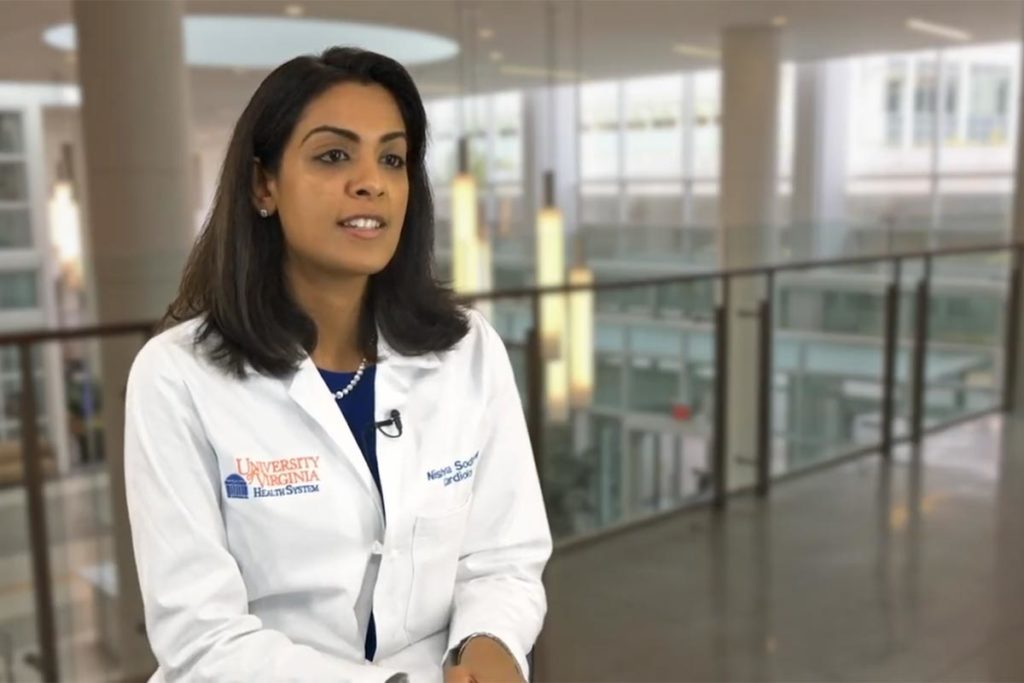Structural and interventional cardiologists can perform minimally-invasive procedures to fix heart-related issues. In the United States, women make up only a small percentage of these specially-trained heart doctors.
Nishtha Sodhi, MD, FACC, FASE, is one of them. She joined our cardiology team in 2019. She treats many heart problems, including:
- Heart valve disease, such as mitral stenosis and mitral regurgitation
- Coronary artery disease
- Heart failure
- Heart attacks
Get to Know Structural & Interventional Cardiologist Nishtha Sodhi
We asked Sodhi to answer our 7 Quick Questions.
1. Why did you become a doctor?
It is an absolute privilege to have the opportunity to positively impact and change someone’s life for the better. I’m grateful for this opportunity and the trust that patients and their families place in me.
In my subspecialty of structural and interventional cardiology, I perform procedures that almost immediately improve patients’ symptoms and quality of life, which is extremely gratifying.
2. Why did you choose structural and interventional cardiology?
I was in my first year of medical school when the early clinical trials on TAVR, or transcatheter aortic valve replacement, started in the United States. Seeing the medical team replace a patient’s aortic valve without opening the chest was incredible. For the first time, there was an option for patients with severe aortic valve disease who might not otherwise be candidates for surviving traditional open-heart surgery.
The technology, the faster post-procedure recovery, and the immediate improvement in patients’ symptoms made a huge impression on me. I decided at that very early stage in my medical career that this was what I wanted to specialize in.
Transcatheter therapies have completely transformed and revolutionized the management of valvular and coronary disease. I feel privileged to be part of this exciting and dynamic subspecialty.
3. What is your favorite thing about Charlottesville?
The amazing mountains, wineries, and outdoor activities!
4. Where did you grow up?
Buffalo, NY and southern New Jersey
5. What’s the most exciting thing or research happening in your field right now?
Transcatheter technologies have completely transformed the treatment of valvular and structural heart disease. Our Advanced Cardiac Valve Center is one of a few places in the United States that offers a full range of transcatheter and minimally invasive procedures for cardiac valve disease of the aortic, mitral, tricuspid, and pulmonary heart valves.
In addition, there are few medical centers in the country that can match the depth of experience we bring to percutaneous (minimally invasive) procedures. We have some of the highest volumes of TAVR, MitraClip, and structural heart procedures in the region. We believe that the expertise we’ve gained translates into better outcomes for our patients.
Additionally, as one of the leading programs in the country, we are fortunate to be involved with a large number of clinical trials using novel transcatheter devices for tricuspid and mitral valve disease. These clinical trials can offer therapeutic options for patients who otherwise might not have any options.
6. Who is your inspiration?
My parents – they taught me the importance of hustle, grit, and seizing opportunities without letting the fear of failure get in the way. They always encourage me to reach for the stars, the sky is the limit!
Heart Disease Care Near You
With clinics throughout central Virginia, we provide comprehensive care for children and adults with heart problems.
7. What’s your favorite thing about working at UVA?
The people! We are a truly multidisciplinary and collaborative hospital and team. I spend the majority of my time working with our advanced cardiac valve team, which is comprised of:
- Cardiologists
- Cardiac surgeons
- Nurse practitioners
- Nurses
- Clinical researchers
- Coordinators
We all work together as a team to design a comprehensive treatment plan that meets the unique needs of each patient and their families. We don’t just treat a medical condition in isolation. We take care of the patient and all of their needs in a comprehensive manner.
We also try and streamline the evaluation process, because we understand that many of our patients are elderly or traveling from far distances. We want to coordinate everything as best as possible for patients and their families.
My name is Dr. Nishtha Sodhi. I am one of the structural and interventional cardiologists in the Department of Cardiology here at the University of Virginia. My area of focus and clinical expertise is in taking care of patients with valvular heart disease and structural heart disease. Oftentimes we’re able to provide patients with transcatheter options to take care of these valvular heart issues and structural heart issues so that patients have an alternative to open heart surgery. Four percent of interventional cardiologists in the United States are women and two percent, half of that number, are interventionists are women. For me it’s a very privileged opportunity to be part of this very small select group of women in the United States that have been trained with this level of expertise and I’m thrilled to be here at the University of Virginia as part of a very collaborative and multidisciplinary team. It’s a very sort of a unique opportunity that we have here because we work so collectively and cohesively together and really provide a comprehensive evaluation process for our patients. It’s a great feeling for me to know that after performing a procedure, patients are feeling better. They’re not having very long recovery times and we’ve truly made an impact in their health and in their quality of life.
